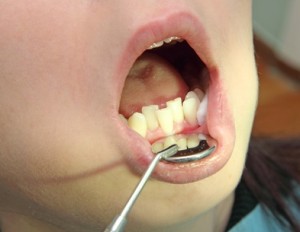 The other day I was asked a couple of interesting questions. The question was: How crooked is too crooked to straighten? Are my teeth too crooked for Invisalign? And, it made me realize that one thing that is seldom addressed is what makes treatment for braces an easy as opposed to a difficult case to treat. And, what exactly is too difficult to treat or not treatable at all.
The other day I was asked a couple of interesting questions. The question was: How crooked is too crooked to straighten? Are my teeth too crooked for Invisalign? And, it made me realize that one thing that is seldom addressed is what makes treatment for braces an easy as opposed to a difficult case to treat. And, what exactly is too difficult to treat or not treatable at all.
 instill good oral health habits in your child. So read on for our recommendations on how to help your little one learn how good oral health starts at home!
instill good oral health habits in your child. So read on for our recommendations on how to help your little one learn how good oral health starts at home!
- Remember the best way for them to learn is to lead by example.
- Despite what your child says they need help brushing. You should be helping brush and checking your child’s brushing until they are at least 9 years old. Most kids do not have the manual dexterity to be efficient brushers until they are older. An electric tooth brush can help with a lot of the plaque removal but you should still be checking their teeth and doing a quick brush up of their back teeth as well.
- Get your child a toothbrush timer! Or an electric toothbrush with a timer built in. Even as an adult its hard to judge 2-3 minutes without some sort of timer.
- Once your child starts to get their adult teeth in you should introduce child flossers. I believe that flossing with children should be done by the child. Flossers get the child used to adding flossing to their daily routine and as they grow and develop better manual dexterity they can replace the flossers with regular floss.
- There are a myriad of dental products that are geared to every age group, in a variety of flavors and textures. Find which is your child’s favorite so the taste is not a deterrent.
- And lastly, DO NOT use going to the dentist as a threat, i.e.: ‘if you don’t brush your teeth then you are going to have to go to the dentist’. You want to avoid attaching negative feelings towards going to the dentist or their home care regimen. Also, its hard as a dentist to start a child’s first dental visit with them already hating being there without ever having been. Instead focus on the positives, for example: ‘If you want to have happy, healthy teeth you have to brush them’
 Being a dentist a question we get quite frequently is: Is this going to hurt? So that brings me to today’s topic: What to expect from your dental visit.
One thing to mention is that in dentistry each individuals experience is different. Just as every person is different we find that every procedure is different. And, quite simply the only time you can consider a dental procedure as having been routine when you have looked at it retrospectively and decided that it had gone routinely. That being said, following is a list of the average experiences of patients for the most common procedures performed in the dental office.
Being a dentist a question we get quite frequently is: Is this going to hurt? So that brings me to today’s topic: What to expect from your dental visit.
One thing to mention is that in dentistry each individuals experience is different. Just as every person is different we find that every procedure is different. And, quite simply the only time you can consider a dental procedure as having been routine when you have looked at it retrospectively and decided that it had gone routinely. That being said, following is a list of the average experiences of patients for the most common procedures performed in the dental office.
- Regular Hygiene/ Cleanings : Regular 6 month recall appointments should be pain free during the procedure as well as after. However, you may experience sensitivity during treatment or soreness afterwards if you: normally experience hot or cold sensitivity, have not had a cleaning in a while or have deep or inflamed periodontal pocketing. For many patients who experience the aforementioned things, as practitioners, we may recommend they be numb for their cleaning appointments to avoid discomfort during the cleaning.
- Fillings and Crown/Bridge: During these appointments you should feel little to no pain once sufficiently numb. Local anesthesia will block any hot, cold or pain sensations, however it will not block the feeling of pressure in the area. After your appointment some may experience hot or cold sensitivity, this does not always happen however it is a risk and typically can last for up to a week or two.
- Root Canal Treatment: Your reaction to this procedure is dependent on the status of the nerve prior to treatment. Teeth that are infected or already in the midst of a toothache may have more difficulty achieving profound anesthesia. However, most patients do not have this experience. Once the area is sufficiently numb, similar to a filling, you should just feel pressure. Afterwards the tooth will normally experience a sore almost bruised feeling for about 5-7 days.
- Extractions and Implant Placement: This procedure, once numb, you will feel pressure and an intense squeezing sensation. The pressure usually is felt throughout the whole quadrant of the mouth that is being worked on. However, you should not feel any sharpness or pain. Afterwards, you should feel sore in the area for about 5-10 days.
